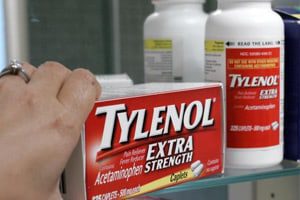
U.S. Tylenol bottles will soon bear a unique warning intended to alert people of the possibly deadly risks of taking too much of the drug’s main ingredient, acetaminophen. The red warnings will soon be found on the cap of every new bottle of Extra Strength Tylenol sold in the United States this October and on […]
 U.S. Tylenol bottles will soon bear a unique warning intended to alert people of the possibly deadly risks of taking too much of the drug’s main ingredient, acetaminophen.
U.S. Tylenol bottles will soon bear a unique warning intended to alert people of the possibly deadly risks of taking too much of the drug’s main ingredient, acetaminophen.
The red warnings will soon be found on the cap of every new bottle of Extra Strength Tylenol sold in the United States this October and on most other Tylenol brand bottles in future months, according to The Associated Press (AP). The rare move comes in the midst of lawsuits and federal government pressure over the highly popular pain reliever.
The new warning is intended to make it very clear that the over-the-counter (OTC) medication contains the pain relieving ingredient, acetaminophen, which is the number one cause of sudden liver failure in the U.S., the AP reported. Executives at Johnson & Johnson—J&J is the maker of Tylenol—said that the highly visible cap warning is meant to gain consumer attention as some consumers do not read existing warnings on the products’ labels. “We’re always looking for ways to better communicate information to patients and consumers,” says Dr. Edwin Kuffner, vice president of McNeil Consumer Healthcare, the J&J unit that manufactures Tylenol. The new cap messages will read: “CONTAINS ACETAMINOPHEN” and “ALWAYS READ THE LABEL.”
Acetaminophen overdoses lead to 55,000-80,000 emergency room (ER) visits annually in the U.S.; 500 people die each year, according to the U.S. Centers for Disease Control and Prevention (CDC) and the U.S. Food and Drug Administration (FDA), the AP reported. Acetaminophen is an ingredient in more that 600 OTC products that are used at least once weekly by 25 percent of the population and include products such as Nyquil cold formula, Excedrin pain tablets, and Sudafed sinus pills.
Despite broad familiarity with acetaminophen, many people are not aware that acetaminophen, in its many forms, carries risk for significant health affects, including serious liver damage. Many patients may not know that the prescription painkiller they’re taking contains acetaminophen and, often, they are not warned to avoid other acetaminophen-containing products. According to a previous article published in the Los Angeles Times, acetaminophen single overdoses resulted in more than 40,000 calls to poison control centers in 2009; such overdoses are among the leading causes of acute liver failure.
The symptoms of an acetaminophen overdose may take up to 12 hours to manifest, and may include abdominal pain, appetite loss, diarrhea, nausea, upset stomach; irritability; jaundice; sweating; convulsions; and coma. Without immediate treatment, a large acetaminophen overdose can lead to liver failure, even death. Acetaminophen liver damage can occur just four days after taking the drug and 44 percent of people who take a form of acetaminophen test with signs of liver enzyme abnormalities.
Taking even a little too much acetaminophen over a few days can lead to fatal overdosing or so-called “staggered overdoses,” which occur when the daily recommended dose is repeatedly exceeded in small amounts. This type of overdose differs from a single overdose in which a person takes too many pills at one time. In fact, staggered acetaminophen overdoses are deadlier than single overdoses, even though smaller amounts of the medication are taken in overdoses that are spread over time. Of concern is that staggered overdoses might not be readily obvious to physicians and those suffering from staggered overdosing may test with blood levels of the drug in amounts smaller than what would point to an overdose, even if the liver is significantly damaged.
The maker of Tylenol faces more than 85 personal injury lawsuits that have been filed in federal court and blame Tylenol for liver injuries and deaths, according to the AP.


